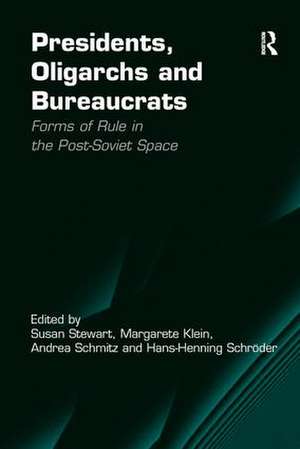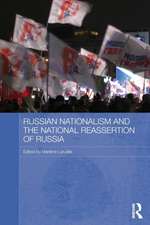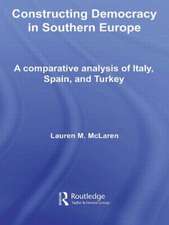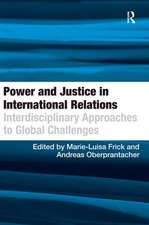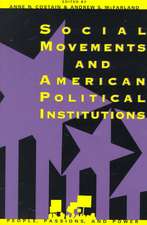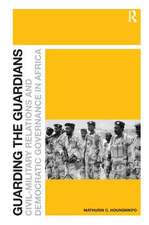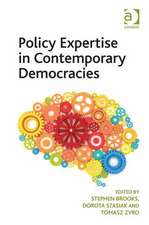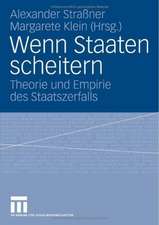Presidents, Oligarchs and Bureaucrats: Forms of Rule in the Post-Soviet Space
Autor Margarete Klein Editat de Susan Stewart Autor Hans-Henning Schröderen Limba Engleză Paperback – 28 noi 2016
| Toate formatele și edițiile | Preț | Express |
|---|---|---|
| Paperback (1) | 469.34 lei 6-8 săpt. | |
| Taylor & Francis – 28 noi 2016 | 469.34 lei 6-8 săpt. | |
| Hardback (1) | 1058.69 lei 6-8 săpt. | |
| Taylor & Francis – 28 ian 2012 | 1058.69 lei 6-8 săpt. |
Preț: 469.34 lei
Nou
Puncte Express: 704
Preț estimativ în valută:
89.80€ • 93.77$ • 74.16£
89.80€ • 93.77$ • 74.16£
Carte tipărită la comandă
Livrare economică 15-29 aprilie
Preluare comenzi: 021 569.72.76
Specificații
ISBN-13: 9781138278790
ISBN-10: 1138278793
Pagini: 280
Dimensiuni: 156 x 234 mm
Greutate: 0.45 kg
Ediția:1
Editura: Taylor & Francis
Colecția Routledge
Locul publicării:Oxford, United Kingdom
ISBN-10: 1138278793
Pagini: 280
Dimensiuni: 156 x 234 mm
Greutate: 0.45 kg
Ediția:1
Editura: Taylor & Francis
Colecția Routledge
Locul publicării:Oxford, United Kingdom
Notă biografică
Susan Stewart, Margarete Klein, Andrea Schmitz and Hans-Henning Schröder all at German Institute for International and Security Affairs, Germany
Recenzii
'20 years after the collapse of the USSR, this volume takes stock of our understanding of the political regimes in the post-Soviet space, throwing new light on many complexities and nuances of these regimes. Focussed and ambitious in its analysis, the volume will be a valuable companion to any student of post-Soviet politics.' Kataryna Wolczuk, University of Birmingham, UK 'The idea behind this book is a good one. Many claims have been made about the nature of post-Soviet regimes but there has been little by way of a consolidated review of the subject. This volume brings together theoretical discussions and case studies, with editorial synthesis in the introduction and the conclusion... this volume is still a very useful and commendable addition to the literature.' Political Studies Review 'This collection provides a useful snapshot of the character of a range of post-Soviet states and how their political systems have developed in the twenty years since they emerged as independent states. The analysis and application of neopatrimonial, competitive authoritarian and hybrid regime-types lays the ground for further consideration of the applicability of these classifications. This collection will be of interest to researchers familiar with the region and those interested in gaining insights into the applicability of these three important classifications of regime-type.' Journal of Contemporary European Studies '... this excellent volume is a major contribution to post-Soviet studies: it provides an exciting debate with diverse and dissenting views on the enigma of the political trajectories in the area.' Europe-Asia Studies
Cuprins
Introduction, SusanStewart, MargareteKlein, AndreaSchmitz, Hans-HenningSchröder; Part 1 Theory; Chapter 1 Forms of Rule in the Post-Soviet Space, TimmBeichelt; Chapter 2 Democracy and a Level Playing Field, StevenLevitsky, Lucan A.Way; Chapter 3 Neopatrimonialism, GeroErdmann; Part 2 Case Studies; Chapter 4 Russia’s Political Regime, MargaretaMommsen; Chapter 5 Subnational Authoritarianism in Russia, VladimirGel’man; Chapter 6 Fascistoid Russia, Alexander J.Motyl; Part 3 Case Studies; Chapter 7 From Competitive Authoritarianism to Defective Democracy, HeikoPleines; Chapter 8 Elections and Treatment of the Opposition in Post-Soviet Georgia, PamelaJawad; Chapter 9 From Corruption to Rotation, ChristianTimm; Part 4 Case Studies; Chapter 10 Changing Political Systems and Regime Types, Paul GeorgGeiss; Chapter 11 Seeing Like a President, SebastianSchiek, StephanHensell; Chapter 12 The Loss of Difference, AlexanderWolters; Chapter 101 Conclusion, SusanStewart, MargareteKlein, AndreaSchmitz, Hans-HenningSchröder;
Descriere
Using case studies from the post-Soviet region, a broad range of international contributors present an original and innovative contribution to the debate. They explore the character of post-Soviet regimes and review the political transformations they have experienced since the end of the Cold War. Through a combination of theoretical approaches and detailed, empirical analysis the authors highlight the difficulties and benefits of applying the concepts of hybrid regimes, competitive authoritarianism and neopatrimonialism to the countries of the post-Soviet space.
